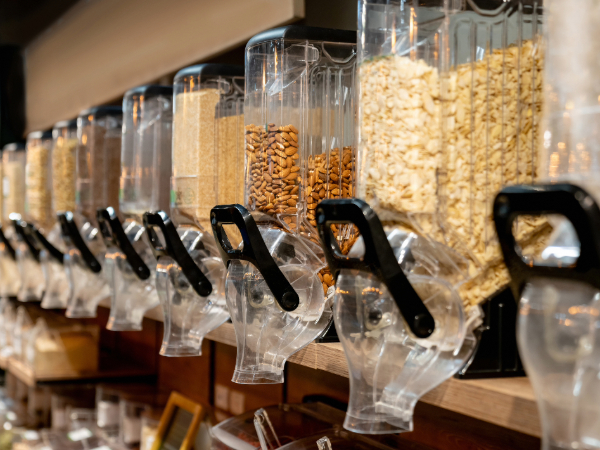
Bulk foods are a great way to save money and reduce packaging waste, so now is the perfect time to start thinking about how to buy in bulk in a way that reduces waste instead of creating it.
There are certain foods that last longer in bulk. Non-perishables, such as dried beans, rice, and pasta, snack foods, like chips and popcorn, salty condiments, such as mustard and ketchup, hard candy, and paper products, such as toilet paper, tissues, or paper towels, all last a long time and are frequently used items that won’t be left on the shelf. Put these at the top of your bulk shopping list.
The main question to ask yourself when buying in bulk is, “How much do I need?” Non-perishables can be bought in large quantities and will sit on the shelf until you need them, but fruits, vegetables, dairy products, and meats require more careful consideration. If you don’t eat a lot of a type of food, it doesn’t make sense to buy a large quantity of it. If you won’t be able to finish it before it goes bad, put the big pack back on the shelf.
Once you get your bulk foods home, store them properly. Put food in air-tight containers and refrigerate or freeze what can’t be left out. Keep food that you need to eat in a visible place so that it’s not forgotten during the week. Place food that is in danger of spoiling in an “eat me first” area in your fridge.
If you do purchase perishable foods in bulk, consider freezing what you can’t cook or eat before it expires. Meat is the easiest to freeze, but most foods can be frozen with a little preparation. Blanch vegetables before they go bad and dry fruits before storing them in the freezer. Fruits like berries and ripe bananas can be frozen without drying and then thrown into a smoothie or batch of muffins. Citrus fruits, like lemons, limes, and oranges, can be sliced and frozen on a flat sheet. After they are frozen, remove them from the sheet and place them into a container. Use the frozen slices to give some flavor to water and other drinks.
Canning, pickling, and boiling are other options for extra food. Almost any vegetable can be canned, and fruit can easily be turned into jam. Boiled bones or vegetable scraps can become soup stock. More than cucumbers can be pickled for a tasty treat.
If you buy a food item in bulk and it spoils before you can eat it, composting is a good last resort. You can place spoiled fruit and vegetables, along with peels, rinds, egg shells, tea bags, and coffee grounds, into your backyard compost bin. Your spoiled food and scraps can create compost to help you grow your own plants! If something spoils, remember to buy less of that item or cook it more quickly in the future.
Start preparing a list of what your family could purchase in bulk. Then head to your local store and start helping your wallet and the Earth! For more tips to consider when beginning a bulk-buying journey, check out A Beginner’s Guide to Buying and Storing Bulk Foods and here’s a BBC reporter’s take on her experience buying in bulk.
Photo credit: Hispanolistic | E+| Getty Images Plus
